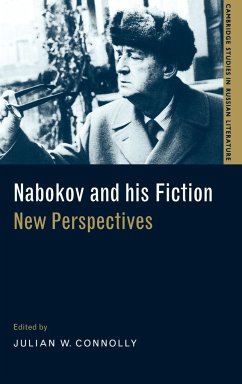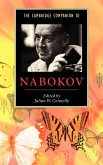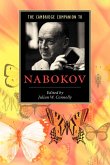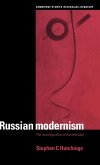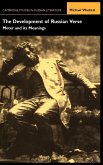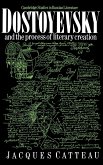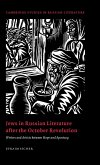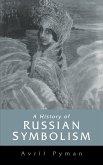- Gebundenes Buch
- Merkliste
- Auf die Merkliste
- Bewerten Bewerten
- Teilen
- Produkt teilen
- Produkterinnerung
- Produkterinnerung
Eleven leading scholars offer original essays on Nabokov and his fiction.
Andere Kunden interessierten sich auch für
![The Cambridge Companion to Nabokov The Cambridge Companion to Nabokov]() Julian W. Connolly (ed.)The Cambridge Companion to Nabokov105,99 €
Julian W. Connolly (ed.)The Cambridge Companion to Nabokov105,99 €![The Cambridge Companion to Nabokov The Cambridge Companion to Nabokov]() Julian W. Connolly (ed.)The Cambridge Companion to Nabokov38,99 €
Julian W. Connolly (ed.)The Cambridge Companion to Nabokov38,99 €![Russian Modernism Russian Modernism]() Stephen C. HutchingsRussian Modernism140,99 €
Stephen C. HutchingsRussian Modernism140,99 €![The Development of Russian Verse The Development of Russian Verse]() Michael WachtelThe Development of Russian Verse136,99 €
Michael WachtelThe Development of Russian Verse136,99 €![Dostoyevsky and the Process of Literary Creation Dostoyevsky and the Process of Literary Creation]() Jacques CatteauDostoyevsky and the Process of Literary Creation142,99 €
Jacques CatteauDostoyevsky and the Process of Literary Creation142,99 €![Jews in Russian Literature after the October Revolution Jews in Russian Literature after the October Revolution]() Efraim SicherJews in Russian Literature after the October Revolution159,99 €
Efraim SicherJews in Russian Literature after the October Revolution159,99 €![A History of Russian Symbolism A History of Russian Symbolism]() Avril PymanA History of Russian Symbolism128,99 €
Avril PymanA History of Russian Symbolism128,99 €-
-
-
Eleven leading scholars offer original essays on Nabokov and his fiction.
Hinweis: Dieser Artikel kann nur an eine deutsche Lieferadresse ausgeliefert werden.
Hinweis: Dieser Artikel kann nur an eine deutsche Lieferadresse ausgeliefert werden.
Produktdetails
- Produktdetails
- Verlag: Cambridge University Press
- Seitenzahl: 270
- Erscheinungstermin: 10. August 2011
- Englisch
- Abmessung: 235mm x 157mm x 21mm
- Gewicht: 593g
- ISBN-13: 9780521632836
- ISBN-10: 0521632838
- Artikelnr.: 21390251
- Herstellerkennzeichnung
- Libri GmbH
- Europaallee 1
- 36244 Bad Hersfeld
- gpsr@libri.de
- Verlag: Cambridge University Press
- Seitenzahl: 270
- Erscheinungstermin: 10. August 2011
- Englisch
- Abmessung: 235mm x 157mm x 21mm
- Gewicht: 593g
- ISBN-13: 9780521632836
- ISBN-10: 0521632838
- Artikelnr.: 21390251
- Herstellerkennzeichnung
- Libri GmbH
- Europaallee 1
- 36244 Bad Hersfeld
- gpsr@libri.de
1. Nabokov at 100 Julian W. Connolly; Part I. Artistic Strategies and
Themes: 2. Setting his myriad faces in his text: Nabokov's authorial
presence revisited Gavriel Shapiro; 3. 'The gift of imagining facts':
Vladimir Nabokov and the art of autobiography Galya Diment; 4. The
near-tyranny of the author: Pale Fire Maurice Couturier; 5. Jewish
questions in Nabokov's art and life Maxim D. Shrayer; 6. 'The dead are good
mixers': notes on individualism in Nabokov's fiction Leona Toker; 7.
Nabokov's trinity (on the movement of Nabokov's themes) Gennady Barabtarlo;
Part II. Literary and Cultural Contexts: 8. 'Imagining other and better
ways of looking': Nabokov's response to the legacy of Fedor Dostoevsky
Julian W. Connolly; 9. Her monster, his nymphet: Nabokov, Mary Shelley, and
the specter of sexism Ellen Pifer; 10. Vladimir Nabokov and Rupert Brooke
D. Barton Johnson; 11. From time to eternity: the critique of historicism
in Nabokov's Russian writings Alexander Dolinin; 12. Poshlust as cultural
critique: Nabokov with Adorno and Malraux at the peak of Hitlerism John
Burt Foster, Jr.; Selected bibliography of works by Vladimir Nabokov;
Selected bibliography of work on Vladimir Nabokov.
Themes: 2. Setting his myriad faces in his text: Nabokov's authorial
presence revisited Gavriel Shapiro; 3. 'The gift of imagining facts':
Vladimir Nabokov and the art of autobiography Galya Diment; 4. The
near-tyranny of the author: Pale Fire Maurice Couturier; 5. Jewish
questions in Nabokov's art and life Maxim D. Shrayer; 6. 'The dead are good
mixers': notes on individualism in Nabokov's fiction Leona Toker; 7.
Nabokov's trinity (on the movement of Nabokov's themes) Gennady Barabtarlo;
Part II. Literary and Cultural Contexts: 8. 'Imagining other and better
ways of looking': Nabokov's response to the legacy of Fedor Dostoevsky
Julian W. Connolly; 9. Her monster, his nymphet: Nabokov, Mary Shelley, and
the specter of sexism Ellen Pifer; 10. Vladimir Nabokov and Rupert Brooke
D. Barton Johnson; 11. From time to eternity: the critique of historicism
in Nabokov's Russian writings Alexander Dolinin; 12. Poshlust as cultural
critique: Nabokov with Adorno and Malraux at the peak of Hitlerism John
Burt Foster, Jr.; Selected bibliography of works by Vladimir Nabokov;
Selected bibliography of work on Vladimir Nabokov.
1. Nabokov at 100 Julian W. Connolly; Part I. Artistic Strategies and
Themes: 2. Setting his myriad faces in his text: Nabokov's authorial
presence revisited Gavriel Shapiro; 3. 'The gift of imagining facts':
Vladimir Nabokov and the art of autobiography Galya Diment; 4. The
near-tyranny of the author: Pale Fire Maurice Couturier; 5. Jewish
questions in Nabokov's art and life Maxim D. Shrayer; 6. 'The dead are good
mixers': notes on individualism in Nabokov's fiction Leona Toker; 7.
Nabokov's trinity (on the movement of Nabokov's themes) Gennady Barabtarlo;
Part II. Literary and Cultural Contexts: 8. 'Imagining other and better
ways of looking': Nabokov's response to the legacy of Fedor Dostoevsky
Julian W. Connolly; 9. Her monster, his nymphet: Nabokov, Mary Shelley, and
the specter of sexism Ellen Pifer; 10. Vladimir Nabokov and Rupert Brooke
D. Barton Johnson; 11. From time to eternity: the critique of historicism
in Nabokov's Russian writings Alexander Dolinin; 12. Poshlust as cultural
critique: Nabokov with Adorno and Malraux at the peak of Hitlerism John
Burt Foster, Jr.; Selected bibliography of works by Vladimir Nabokov;
Selected bibliography of work on Vladimir Nabokov.
Themes: 2. Setting his myriad faces in his text: Nabokov's authorial
presence revisited Gavriel Shapiro; 3. 'The gift of imagining facts':
Vladimir Nabokov and the art of autobiography Galya Diment; 4. The
near-tyranny of the author: Pale Fire Maurice Couturier; 5. Jewish
questions in Nabokov's art and life Maxim D. Shrayer; 6. 'The dead are good
mixers': notes on individualism in Nabokov's fiction Leona Toker; 7.
Nabokov's trinity (on the movement of Nabokov's themes) Gennady Barabtarlo;
Part II. Literary and Cultural Contexts: 8. 'Imagining other and better
ways of looking': Nabokov's response to the legacy of Fedor Dostoevsky
Julian W. Connolly; 9. Her monster, his nymphet: Nabokov, Mary Shelley, and
the specter of sexism Ellen Pifer; 10. Vladimir Nabokov and Rupert Brooke
D. Barton Johnson; 11. From time to eternity: the critique of historicism
in Nabokov's Russian writings Alexander Dolinin; 12. Poshlust as cultural
critique: Nabokov with Adorno and Malraux at the peak of Hitlerism John
Burt Foster, Jr.; Selected bibliography of works by Vladimir Nabokov;
Selected bibliography of work on Vladimir Nabokov.

